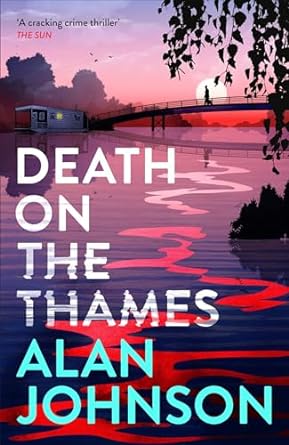About the Book

1999. A young Detective Constable Louise Mangan crosses the Thames one misty morning in pursuit of a killer. She finds a tranquil community on a leafy island close to Hampton Court Palace, but soon realises that all is not as it seems. There is something evil at play in this quiet suburb, and this junior detective’s questions seem only to scratch the surface.
Twenty years later, a horrific fire brings Detective Chief Superintendent Mangan back to that same island. Soon, she discovers that murder was just a drop in these dark waters.
The river runs deep, and the tide is rising at last. Will the truth rise with it?
Format: eARC (336 pages) Publisher: Wildfire
Publication date: 28th March 2024 Genre: Crime
Find Death on the Thames on Goodreads
Purchase Death on the Thames from Bookshop.org [Disclosure: If you buy books linked to our site, we may earn a commission from Bookshop.org, whose fees support independent bookshops]
My Review
Alan Johnson moved from writing award-winning memoirs to writing crime fiction in 2021 with the publication of The Late Train to Gipsy Hill, a book I very much enjoyed.
In the first half of this third book in the series, we travel back to 1999 to meet the young Louise Mangan, then a Detective Constable. Despite being obviously capable, she is experiencing the persistent and ‘casual’ misogyny that pervaded the Metropolitan Police at the time. (Many would argue it still does, and this is picked up again in the second part of the book.) Louise is frustrated at being sidelined from major operations and having her suspicions that the man arrested for a series of assaults on women may not be the culprit. Louise decides to pursue her own enquiries but the success of a major police operation to close down a drug smuggling operation sees her moved off the case despite, in her mind, there being plenty of loose ends still to be tied up.
One of the interesting things about this part of the book is how much that we now take for granted in police investigations was in its infancy in 1999. For example, the DNA database was still regarded as ‘nascent technology’ and DNA samples were not routinely checked. And the Metropolitan police were only just beginning to use electronic forms of communication, in the face of some resistance.
The second half of the book moves us on twenty years, to 2019. This is where I came a little unstuck because, although I own a copy of the second book, One of Our Ministers is Missing, I haven’t yet read it. Between the first and this third book, Louise Mangan’s career has obviously progressed significantly. There have also been big changes in her private life since 1999. The latter go pretty much unexplored with some surprising omissions. The misogyny Louise experienced in the first part of the book, although less widespread, is still there and, mirroring recent events in the Metropolitan police, there are officers whose conduct really should mean they have no place in the police force. Louise is also frustrated about the Met’s record on tackling violence against women and girls, again reflecting contemporary concerns.
The author really ups the twists and turns of the plot, and the thriller element in the final quarter of the book. Louise’s persistence – and some intelligence from an unlikely source – eventually leads to a group of dangerous criminals being brought to book and a longstanding mystery being resolved. And perhaps never believe what you’re told unless you’ve double-checked it, even triple-checked it, is sage advice? Louise also discovers startling evidence of an operation sanctioned at the highest level which raises the question: can the end ever justifies the means?
Death on the Thames is another well-crafted police procedural that left me hoping Louise can be persuaded against retiring for a little while longer.
I received an advance reader copy courtesy of Wildfire via NetGalley.
In three words: Intriguing, authentic, absorbing
Try something similar: Payback by R. C. Bridgestock
About the Author

Alan Johnson’s childhood memoir This Boy was published in 2013. It won the Royal Society of Literature Ondaatje Prize, and the Orwell Prize, Britain’s top political writing award. His second volume of memoirs, Please Mr Postman (2014), won the National Book Club award for Best Biography. The final book in his memoir trilogy, The Long and Winding Road (2016), won the Parliamentary Book Award for Best Memoir. In My Life – A Music Memoir was published in 2018 and his highly acclaimed first novel, The Late Train to Gipsy Hill, was published in 2021.
Alan was a Labour MP for 20 years before retiring ahead of the 2017 general election. He served in five cabinet positions in the Governments of Tony Blair and Gordon Brow, including Education Secretary, Health Secretary and Home Secretary.
He and his wife Carolyn live in East Yorkshire.

